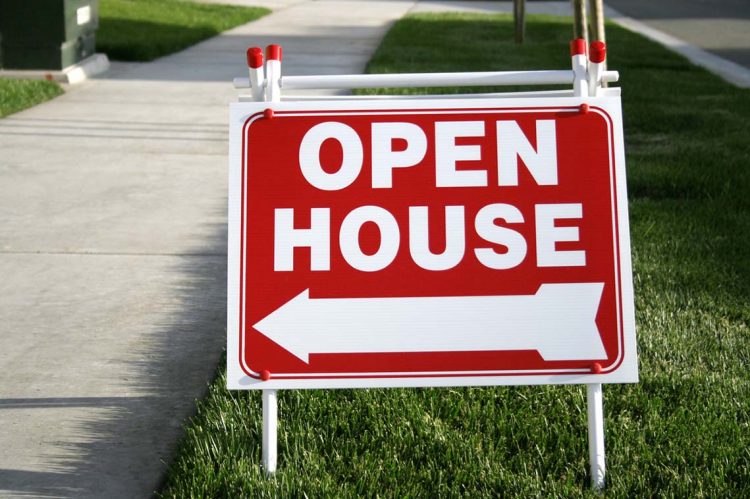For decades open houses have been a staple in real estate, offering aspiring home buyers a window into what the market offers. While the boom of tech and innovation have caused some to question the practice’s viability, many still believe it’s a worthwhile investment for agents and clients.
“Even in an age where we can buy everything online, whether groceries, electronics, clothing or cars, consumers may still prefer to see and experience certain things in person,” says George Ratiu, senior economist & manager of Economic Research at realtor.com®. “Realtor.com data highlighted that almost 70% of home sellers chose to stage their homes in 2022, a clear signal that buyers’ visual and tactile experience matters.”
That’s also been evident in the spring home-buying market, which has continued to buzz despite rising home prices and mortgage rates, and inventory constraints straining buyers.
According to recent data from Zillow, the percentage of homes for sale with scheduled open houses has continued to climb since the start of the year. The portion of listings with open houses scheduled hit 23.6% in April, which a Zillow spokesperson says is its highest level since January 2019.
The Practice Remains
As the churn of homes for sale remains accelerated in this year’s market, agents nationwide say they still find open houses to be useful to their businesses.
“When you do an open house, clearly as an agent, you’re doing it to get activity for the seller hopefully, but if you don’t, that agent also wants to pick up clients,” says Phoenix-based agent Bobby Lieb at HomeSmart.
In a competitive environment, Lieb says traditional open houses are still viable tools for agents—particularly newer ones—to develop their network of clients and colleagues in their respective markets.
“When I first started, that’s how I met people,” he says. “You can have all these pretty pictures on the internet and fancy marketing ways, but nothing replaces seeing the house in person.”
Boise-based agent Jennifer Clements at Trailhead Realty Group with Fathom echoed similar sentiments, adding that open houses have continued to be a boon for her business despite the lull during the pandemic.
“At open houses people get to really meet you,” she says, adding that she has relied on the practice to generate leads and referrals organically throughout her four years in the industry.
“Not only are you offering a tool to your sellers and you are getting leads, but you are also finding buyers for these homes,” Clements continues. “It’s not just about the agents getting leads anymore. This is actually working to the benefit of the seller.”
According to Clements, out of six recent open houses she has held, five were attended by eventual buyers.
Aside from finding buyers, Bobby Martins, a broker associate with Move Up San Diego brokered by eXp Realty, says he also uses open houses to source new listings.
Martins tells RISMedia that he and his agents connect with local homeowners interested in selling their homes during their public showings and partner with banks to buy their home and provide liquidity for the seller to purchase their next property.
“Most agents are focused on finding the buyer in the open house,” Martins says. “We’re trying to find the sellers and tell them about the trade-in option because it allows them to be a cash buyer before selling, which is a great new tool for homeowners.
“The biggest problem facing homeowners right now and the top reason we have not alot of inventory is that sellers don’t want to sell their homes until they buy first,” he adds.
Foreseeable Changes
Open houses may have been limited during the pandemic, depending on the market, but the increased popularity of Zoom and other virtual tools helped move things along until restrictions eased. However, it also left some agents questioning whether open houses are an antiquated practice.
Felicia Beltran, an agent with Empire Group in Southern Colorado, was among them. In an interview with MarketWatch earlier this year, she indicated that open houses might not serve a purpose in today’s tech-forward market.
At the time, the Omicron variant had blindsided much of the nation as COVID cases started to surge again . However, Beltran has changed her mindset as restrictions have eased, feeding into the buzzing market activity in 2022.
“I hadn’t done any for a long time, but I was pleasantly surprised at the amount of foot traffic,” she says. “Now that things have normalized a little bit with society and the economy, I think people want to walk through properties.”
While she expects open houses to remain a fixture in the industry, Beltran says the practice will likely evolve amid the persisting tech and innovation in the industry.
“We will see a lot more virtual interaction—people posting their open houses online as well—to get people to go and schedule future showings and promote high visibility for the listings,” she says.
Alex Chingas is a sales associate at the Bross Chingas Bross Team with Coldwell Banker in Connecticut. He says an influx of would-buyers attending his open houses has also catalyzed a growing trend of house hunters seeking a more personalized experience amid the rush for homes.
“The most serious buyers—those that want to secure a property and make the strongest offers—prefer to view the house by appointment,” he says. “I’m finding that buyers place a much higher value on the individual attention they get when they develop a deep relationship with a buyer’s agent.”.
Admittedly, Chingas tells RISMedia that busy open houses in today’s market have made it challenging to provide one-on-one attention to visitors.
Consumer demand for individual services mixed with the growing foot traffic has made it necessary for multiple agents to staff listings, according to Chingas.
“We want to make sure that the house is well covered, and we don’t have a large number of buyers in the house unattended at any given point in time,” he says. “We are finding it useful to have multiple agents on-site no matter what property it is because of the sheer number of people attending.”
Lieb also encourages his agents to do the same at their open houses in the Phoenix market. Not only is that useful at larger listings, but he also says multiple agents at open houses allow newer agents to learn on the job.
Several agents also note that holding open houses has become a more prominent practice several days a week.
“In the olden days, Saturday and Friday open houses were nonexistent because of the advertising of open houses, and that is one thing that has changed the game altogether,” Martins says, adding that he and his team hold public showings on from 3:00 pm to 6:00 pm on Friday and 1:00 pm to 4:00 pm on the weekends.”
“I know agents who do open houses six or seven days a week,” Martins continues. “With Zillow, Redfin and other websites, they can advertise the open house 24/7. In the old days, we didn’t have that. We had the weekend paper.”
According to Chingas, who implements a similar practice, hosting open houses multiple days during the week is a response to the competition for listings in the market as buyers look to visit properties as early as possible.
While he thinks open houses will still be viable tools for agents in today’s market conditions, Martins believes that could change as inventory levels rise in the future.
“Once you have a lot of inventory, that’s when the market will slow down and when you’re going to see open houses disappear,” he says. “You won’t want to have agents sitting at a property that isn’t getting any traffic.”











